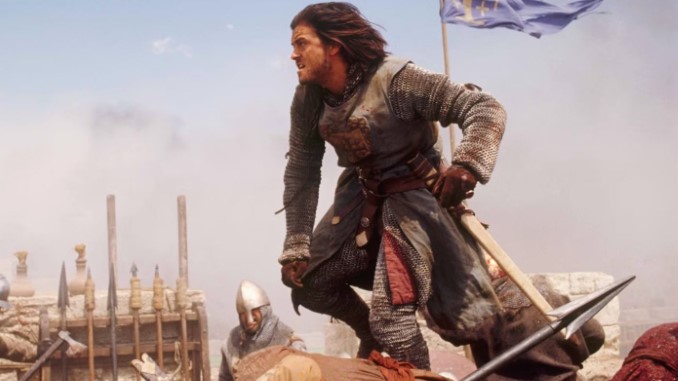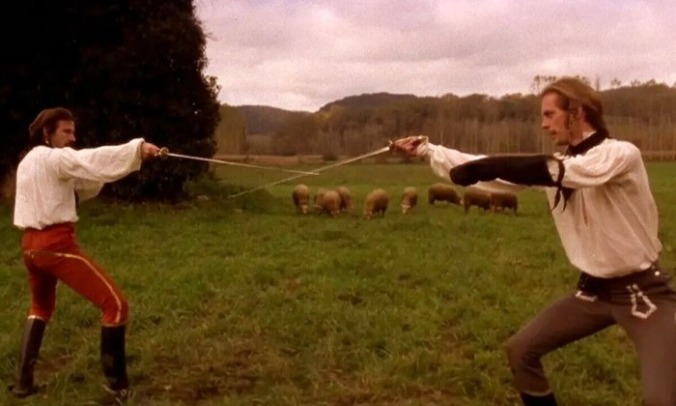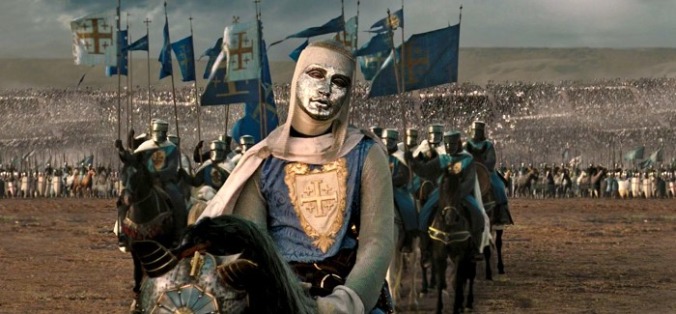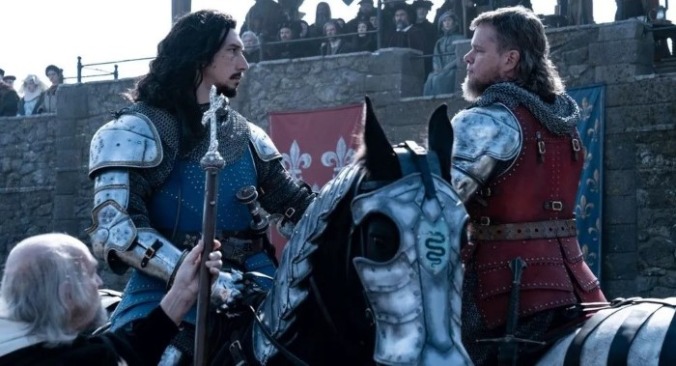Man at War: Ridley Scott’s War Films Show an Inconsistent but Striking View of History

How much sway can one soldier have on an entire war? Gladiator II returns to the many-fronted combat of Ridley Scott’s 2000 original, which revived the sword-and-sandal film all the way to the Academy Awards, and combat is on every character’s mind. The elites and plebeians watch bouts on the Colosseum sand; a Roman expat (Paul Mescal) in Numidia before it was annexed for Rome’s Africa Nova campaign, plots vengeance from a gladiator cell on the Roman general (Pedro Pascal) who killed his wife; Rome’s ambitious power-players plot the empire’s future behind the ravings of the twin tyrant emperors (Fred Hechinger and Joseph Quinn).
Gladiator II is a film about war coming home to roost in the seat of the Roman Empire, and as our titular slave fighter confronts his true lineage, Rome sits on the verge of a civil war that would disband it roughly 200 years earlier than is historically scheduled. In the first Gladiator, Marcus Aurelius’ words “There was once a dream that was Rome,” echoed through Maximus’ mission to correct his injustice, and they have lingered in the minds of the noblest and truest soldiers of an idealized Rome, even if the details of Roman reform are left unarticulated. It’s a solid framework to hang a satisfying (but not particularly necessary) Gladiator sequel on, but as Ridley Scott has spent the best part of 50 years looking at real wars – historical and contemporary – it feels apt that Gladiator II wants us to focus on the folly of war rather than its glory. Still, few of Scott’s war and military films feel like they strike a perfect balance between cinematic carnage and meaningful critiques of what’s causing it.
Questioning the purpose and impulse behind war is a regular motif in Scott’s work, but it is not a consistent one. Since Gladiator, the way he explores historical crises and oversights gives us a body of work that zeroes in on the destructive psychology of the conqueror, but doesn’t always deconstruct the myth of combat’s nobility. Looking at four Ridley films set across French history – Kingdom of Heaven, The Last Duel, The Duellists, and Napoleon – it feels as if the director’s perspective on how history remembers itself has evolved, and by focusing on a country’s history that isn’t British or American, his films are freer to excavate the indignity, instability, and loneliness of war and read into the patterns of other Western nations that try to conquer the world.
“I was pretty impressed always by my relationship with the military,” said Scott in 2019. Hopefully he’ll clear up his thoughts on France with as much blunt candor – he’s happy to bad-mouth it in interviews while profiting from hotels in his expat Provence estate. What’s remained consistent since his debut The Duellists is his fascination with its massive, costly military history. Napoleonic history can be seen from polar perspectives in The Duellists and Napoleon, which focus on the deep-rooted urge for personal, physical and mental triumph over one’s perceived enemies that matched the ambition of France’s post-revolutionary chaos. What qualifies as an enemy to the men of early 19th century France? Well, if you ever feel slighted or that your authority is questioned, this is as good a reason as any to invoke the tradition you’ve modeled yourself against and react with aggressive, sometimes obscene force.
The momentum of Napoleon Bonaparte (Joaquin Phoenix) is undeniable but it is also unstable; as Scott’s portrait of a domineering but flailing emperor keeps expanding its horizons, the figure of its leader grows more isolated, inconsequential, and disposable. Pivotal turning points happen in quiet rooms rather than booming battlefields – especially after the death of his beloved Joséphine (Vanessa Kirby), who herself wasn’t exempt from his narcissistic paranoia. Throughout Napoleon’s ascent and demise, The Duellists sees two officers in the French army spend the first 16 years of the 1800s in a dogged battle where Feraud (Harvey Keitel) vows to kill d’Hubert (Keith Carradine) through dueling.

As the Napoleonic era and its aftermath ticks on in the background, Feraud’s dedication to defeating his opponent seems more stable than Napoleon’s rule, indicating that an ideological cause is far harder to defeat than a fragile empire or a weak invading military. The Duellists complicates d’Hubert’s character with shades of aristocratic careerism, and although Feraud is definitely the less secure and more irrational of the pair, his devotion to his cause allows him to hold onto a shred of dignity.
Bettering yourself in service to your country is further championed and critiqued in two other Ridley Scott films set in French history – Kingdom of Heaven and The Last Duel. In the former, blacksmith-turned-nobleman Balian (Orlando Bloom) ventures to Jerusalem to seek salvation when the peace between Sultan Saladin (Ghassan Massoud) and the Crusader states is fractured by the Templar Knights. Balian faces off Saladin at Jerusalem’s gates but is resoundingly defeated and forced to give up the city. He asks Saladin what Jerusalem is worth, to which Saladin playfully replies, “nothing” and “everything”. Balian’s fierce sense of nobility and dignity has been cracked by the costly defeat.
Kingdom of Heaven models itself after David Lean epics, and as the United States was waging an ideological, nationalist, and unjustifiable war in the Middle East as the film was produced and released, it feels like as much of a cultural correction to American Christian zealotry as Lawrence of Arabia from a cynical but centrist craftsman like Ridley Scott can be. That is to say, the Muslim characters are given an uncommon humanity in a 2000s Hollywood film, but they aren’t immune from being otherized from the European characters in regards to their intellect and philosophy – a textbook Orientalist move. (Not to mention Ridley would undo this measured representation in his all-white version of Moses freeing the Jews from Egyptian slavery in Exodus: Gods and Kings.)
But something about Balian’s obstinance in giving up Jerusalem, which turns into a muted humbleness when he returns to his French homestead, may be more telling that Scott intends – by the end of Balian’s journey, his hopes of victory and fear of defeat was informed by ego that became fused with ideology. Scott likes to focus his epics on as singular and strong a character journey as possible – but unlike Maximus, who symbolized a more abstract, peaceful form of Roman dominion, Balian’s historical context makes him a symbol of the more dangerous impulses and creeds that would drive Christian forces on more organized and lethal crusades in the centuries that followed.

In 2021, Ridley Scott undermined the ruthless masculine perspective taken by his historical films with The Last Duel, set 200 years after Kingdom of Heaven in France in the middle of the Hundred Years’ War, where a unpopular nobleman Jean de Carrouges (Matt Damon) accuses the court’s favorite Jacques le Gris (Adam Driver) of raping his wife Marguerite (Jodie Comer). The film is upfront and unsubtle in how it wants to undermine the traditional dichotomy of bruised, masculine egos like we saw in The Duellists by retelling the same story from first Jean’s perspective, then Jacques, and then finally Marguerite’s. Scott’s film doesn’t question Marguerite’s version of events, in fact it centers her dispossession and pain its center focus to make us reflect on how the short-tempered, prideful Jean and the arrogant, violent Jacques manufacture how they want others to see them, even believing their own selective narrative.
By the time we reach the climactic duel, everything between the three characters has been said and very little justice has been achieved. Marguerite spoke truth to power against the abuses of the French chivalric code, was bound by patriarchal laws, and was rendered invisible in a system where she knew that what happened to her will repeat through history. Balian loses the Holy Land but still feels it possible to return to a life of bruised but intact dignity, a fate that is complicated by Marguerite’s mistreatment – nobility is reserved for fighters whose stories of survival benefit how the state mythologizes itself.

Whether it’s done self-consciously or not, the more cynical and biting view of how power rots those it touches that Ridley has shown in his 2020s films and carried into Gladiator II can easily be applied to his films on the U.S. military and foreign policy as well. G.I. Jane, Black Hawk Down, and Body of Lies are each guilty of replicating prevalent and troubling attitudes towards America’s desire for military dominance. G.I. Jane’s blunt liberal hypothesis is that accusations of regressive misogyny in military ranks will disappear if women take up the roles usually reserved for men, even though Jordan O’Neill (Demi Moore) is only deemed an acceptable Navy Seal candidate when she passes for a macho, self-reliant man (in response to gendered violence, no less).
Black Hawk Down’s ground-level, urgent focus on the survival of U.S. troops in the 1993 Battle of Mogadishu deliberately omits the context of American interventionism in Somalia and stoking the flames of further U.S. presence in Somalia and its neighbors, according to an actor in the film whose anti-war speech was trimmed before the release, mere months after 9/11. Deep into the War on Terror, Body of Lies looked at a surveillance tech-driven CIA hunt for Al-Qaeda aligned terrorists in Jordan, undercutting its intended skepticism about the precision and clarity of technology used by US intelligence with blunt, Orientalist readings of the terrorist cells (a repeat of some of the worst traits of Kingdom of Heaven) and by casting white Englishman Mark Strong as a Jordanian.
There’s a carelessness to Ridley Scott’s films about American armed forces and wars, as if their contemporariness leads to a more slack, less intentional glimpse at how systems and hierarchies operate in combat. His films about older French history indicate his critical lens on war works better in the abstract, where the clash of distant past and familiar faces let us read into the folly of history from a distance that’s close enough to feel all the fierce emotions of what’s happening.
But France isn’t so far away for an Englishman, and the failure to consistently, fairly show a non-white perspective (with non-white faces) from outside the imperial core across his filmography indicates a crucial flaw in his historical perspective: the French, like the Romans in Gladiator, are recognizable enough for Scott to relate to their wisdom and nobility, but distant enough for him to not feel totally implicated by their every failure. It’s not until we see the considerably more limited scope of his American war films that we realize why historical films suit his ambitions far better – and what imperfections stick regardless.
Rory Doherty is a screenwriter, playwright and culture writer based in Edinburgh, Scotland. You can follow his thoughts about all things stories @roryhasopinions.







































